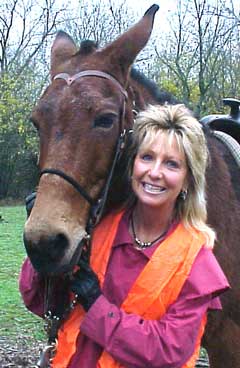By Cindy K. (McKinnon) Roberts
Motivation and learning in the mule is rather interesting. A good trainer knows how to motivate the equine's mind. A really good trainer, knows how to motivate the mule. Motivation, meaning...the desire to learn or improve upon. There are four motivation factors in the mule. They are: 1) to please, 2) food, 3) fear, and 4) curiosity.
Motivation to please is far more common in mules than in horses. The mule's desire and ability to bond with one person, is proof of this. There has to be a strong attachment between both rider and mule, in order to motivate the mule to please. A friendship such as this, excels in competition. I feel....the mule can learn at a faster rate, when a positive relationship has been developed with his trainer. Somehow, this matters to the mule. Your positive approach attitude with no apprehension, is the most beneficial to training your mule.
desire and ability to bond with one person, is proof of this. There has to be a strong attachment between both rider and mule, in order to motivate the mule to please. A friendship such as this, excels in competition. I feel....the mule can learn at a faster rate, when a positive relationship has been developed with his trainer. Somehow, this matters to the mule. Your positive approach attitude with no apprehension, is the most beneficial to training your mule.
Motivation by food is where the mule and horse differ again. Horses can almost always be "tricked" or motivated by food, at any point of their training. Enticing a horse with grain, to load into a trailer is one example. The mule however, may be enticed or motivated by food...but not always. The conditions have to be "right." For one, the mule cannot be fearful, anxious or suspicious. Or, even mad. In my experience, mule's have refused food if they were fearful, anxious, apprehensive or angry. A horse is more apt to eat under stressful conditions, whereas a mule will not. Mules of higher intelligence and or, with shorter temperaments, are less likely to be enticed with food. And really, mules of this type of caliber, do much better without using food as a reward, within their training program. Mules with slower learning abilities, or mules that possess easy going attitudes, are more easily trained with food used as a reward.
There is a negative side to using food while training your mule. It can produce anxiety behavior, simply because the mule is anticipating what comes next. The mule may perform or rush through a task because he is expecting the reward. An example that comes to my mind...is when I retrained a barn sour mule, using food as a reward. After riding a certain distance from the barn, I rewarded the mule with handfuls of grain. I did this for several days. At first, the mule anxiously "beat feet" back to the barn until she got the hang of it. Upon returning to the barn, there was no reward or comfort to speak of. She watched the sun go down many evenings, while tied to the hitching post, alone. There was no reward for returning to the barn. The reward was found....out on the trail. This was the perfect cure for this barn sour mule. In no time at all, she was more than willing to leave the barn. I continued to reward her with grain, even after riding several miles out. She became very confident and would ride alone, with no problem at all. On her "off" days, she would step out and even trot to get to our destination knowing that, she would be rewarded. I knew if I kept up my "tasty" reward program, than my problem would soon be reversed.
Young mules however, do well with food as a reward and I have used it often when asking a correct response to a difficult task. Be careful not to "over do" your food reward.
Source: http://www.everycowgirlsdream.com

Borgata Hotel Casino & Spa - Mapyro
ReplyDeleteFind 하남 출장마사지 the best Borgata 정읍 출장안마 Hotel Casino & Spa (Pottawas) 속초 출장샵 location in Greater Philadelphia. Complete casino 구리 출장샵 information, reviews, photos 보령 출장샵 and more.